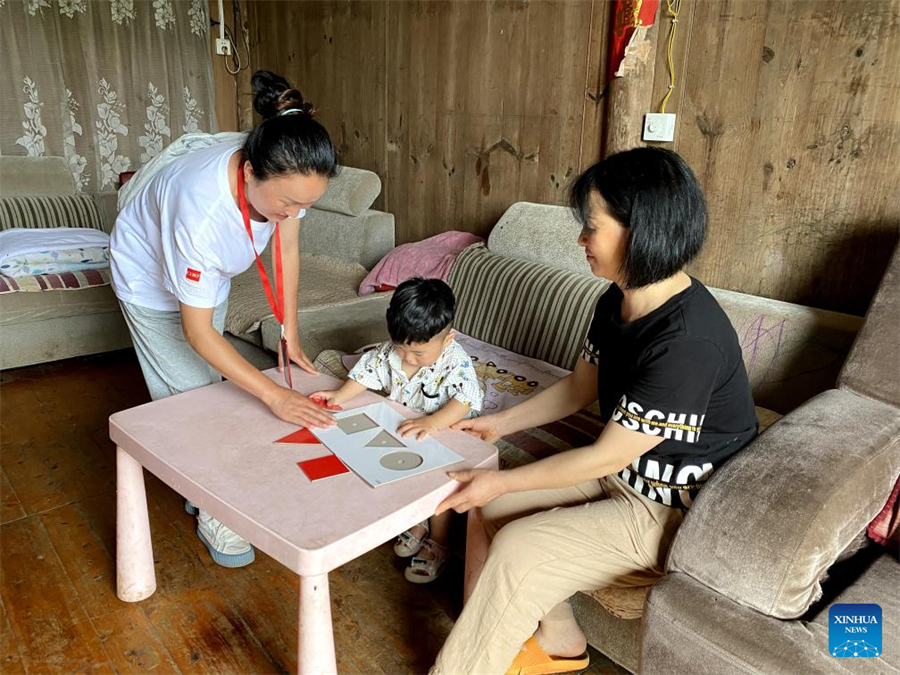Early childhood education program ensures strong foundation for rural kids

Childcare instructor Quan Jiacui (L) interacts with a child in Henan Village of Guzhang County, central China's Hunan Province, May 31, 2023. [Xinhua/Liu Wangmin]
by Xinhua writers Lyu Qiuping, Liu Wangmin
CHANGSHA -- After identifying the triangle, circular and square shapes, and skillfully stacking four layers of toy blocks, 21-month-old Ding Junming clapped his hands while his mother Zhang Wenli and childcare instructor Quan Jiacui watched on with smiles.
"Engaging in activities such as shape recognition and playing with toy blocks can effectively nurture children's spatial awareness," said Quan, who hails from the rural area of Guzhang County in central China's Hunan Province.
In the mountainous county, where many young parents are away working in cities, the home-based early childhood education program launched in June 2018 has enabled rural children to receive professional childcare under the guidance of trained instructors like Quan.
The 36-year-old childcare instructor began her career in August 2018, and is now in charge of 13 children, giving each child an hour of lessons every week. The curriculum primarily revolves around puzzle games, offering tailored curriculum designs for various age groups to effectively boost children's communication and learning capabilities.
Zhang said that due to her and her husband's work commitments away from home, Ding and his elder sister, who is in kindergarten, were mainly raised by their grandparents, resulting in a lack of emphasis on intellectual development education. "Thanks to the professional guidance, the kids have grown more active," she said.
Initiated by the China Development Research Foundation (CDRF), the program integrates parenting guidance and nutritional advice for children aged 6 to 36 months in underdeveloped rural areas of China. It aims to improve the quality of interaction between rural children and their caregivers, promote children's cognitive, language, social and overall health development, and explore an early childhood education model that is suitable for rural China.
Zhang Yan, overseeing the program in the county, explained that the instructors primarily comprise local mothers who, speaking the same dialect, can establish smoother communication with the children while kindergarten teachers can also take on part-time roles as instructors.
"They undergo multiple rounds of training before getting professional guidance," she said, adding that all the children can have courses free of charge.
The program's WeChat applet has logged details such as the frequency of home services, curriculum titles and the names of participating parents, and a specific textbook has also been compiled.
According to the textbook, the curriculum for a 6-month-old baby is mainly about guided parental feeding, such as the correct breastfeeding gestures and the introduction of solid foods, a 13-month toddler will be guided to practice grasping skills and hand-eye coordination through toys like a drum-shaped rattle, while a 33-month infant can be taught to recognize red, yellow and blue colors and sing children's songs.
However, not all home services proceed seamlessly. "Sometimes, our instructors would trek for a long time to arrive at the scheduled time, only to find that the child had already fallen asleep," Zhang Yan said, adding that some sessions had to be conducted in the field due to parents being occupied with agricultural activities during the busy season.
To date, more than 1,400 children and infants have benefited from the program, with more than 60 instructors currently serving nearly 700 children.
Yao Zujun, deputy county head, said that this program has effectively addressed the gap in rural early childhood education, contributing to the reduction of disparities between urban and rural areas.
Yao went on to add that the CDRF allocates annual funding of 2 million yuan (about 280,000 U.S. dollars), while the county, serving as the only pilot area of the program in Hunan, earmarked another 2 million yuan to ensure its smooth operation.
"Guzhang County will further enrich the course content and plans to expand the beneficiary group to urban residents with financial difficulties to ensure that children can have a good start in life," Yao said.
Intern He Lewei contributed to the story.
























